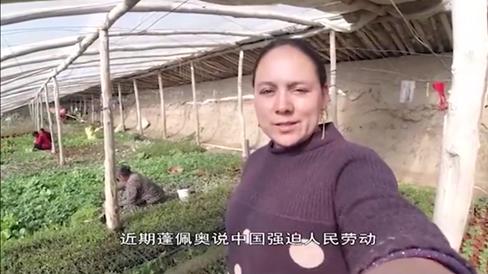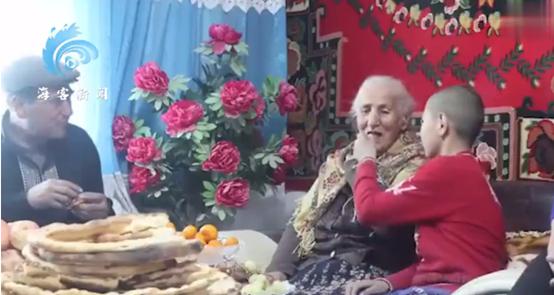


A female farmer from Xinjiang shows the viewers her daily work and life as a reply to forced labor claims hyped by the US.
Some Uygurs have recorded daily life videos to tell the outside world what's really happening in Xinjiang, debunking recent anti-China rumors spread by the US.
A female farmer from northwest China's Xinjiang Uygur Autonomous Region created a self-recorded video, showing the viewers her daily work and life as a reply to forced labor claims hyped by the US.
Owning five polytunnels with 10 employees, the woman said in the video that, without being forced to work, she just wanted to earn more money with her own hands.
"Now I can earn a net annual income of 200,000 yuan (about 30,000 US dollars). So why not seize this good opportunity? I'm not an idiot. I don't need to be forced to work," she said, sending out an unequivocal message against claims that there are mass forced laborers in Xinjiang.
In the video, she also showed her polytunnel for strawberries, saying the strawberries would ripen in a month, and then many tourists would visit her polytunnel and pay to pick the strawberries.
According to a white paper on the employment and labor rights in Xinjiang Uygur Autonomous Region, workers' job preferences have always served as an important reference for the local government of Xinjiang in designing its employment policies, expanding employment channels, creating jobs, organizing vocational training sessions, and providing placement services.
"This ensures that the people can make their own choices about work and enjoy a happy life," the white paper says.

A 91-year-old Uygur woman (central) shares her happy life with viewers, refuting some US politicians' claims that China is committing genocide.
Aside from the farmer, a 91-year-old Uygur woman spoke on camera to share her happy life with viewers.
"I've got five sons, two daughters, and over 40 grandchildren and great-grandchildren. I feel truly happy," she said.
Her words came after some US politicians claimed that China is committing genocide and crimes against humanity against Uygurs and other ethnic groups in Xinjiang.
"I felt indignant when my grandson told me that a man named Mike Pompeo accused China of committing ‘genocide.' I've got over 40 grandchildren and great-grandchildren! Pompeo, you are such a big liar," she said.
Statistics show that the Uygur population in Xinjiang increased from 5.5 million to 12.71 million from 2010 to 2018. This increase rate is not only higher than that of the entire Xinjiang population, but is also more than 10 times the growth rate of the ethnic Han population over the same period. The average life expectancy of Xinjiang residents has increased from 30 to 72 years old over the past six decades or so.
"There's never ever such thing as genocide in China. Period," China's Foreign Ministry Spokesperson Zhao Lijian said at the regular press conference on Jan 28, saying Xinjiang has never been more prosperous than it is now with unprecedented achievements in socio-economic development and improvement of people's life.
Zhao's remarks have struck a chord with many Chinese netizens, who flooded the comments section on social media to voice their support. "Genocide? It appears that our Uygur celebrities such as Dilraba Dilmurat and Guli Nazha are not famous enough…" read one comment, while another user teased that, "Come on, American politicians. It is the 21th century. Get on your internet, please."
These Uygurs are just a small proportion of Xinjiang residents who are using their voice to speak up about what is happening in Xinjiang, which proved to be the best refutation of certain US politicians' groundless accusations.
Zhao Lijian urged the US side to "heed the voice of all 1.4 billion Chinese people, including 25 million Xinjiang residents of various ethnic groups" to deal with the relevant issues in a prudent, fact-based and responsible manner.
"The dogs bark, but the caravan goes on," said a Uygur girl in a short video.
 Fire brigade in Shanghai holds group wedding
Fire brigade in Shanghai holds group wedding Tourists enjoy ice sculptures in Datan Town, north China
Tourists enjoy ice sculptures in Datan Town, north China Sunset scenery of Dayan Pagoda in Xi'an
Sunset scenery of Dayan Pagoda in Xi'an Tourists have fun at scenic spot in Nanlong Town, NW China
Tourists have fun at scenic spot in Nanlong Town, NW China Harbin attracts tourists by making best use of ice in winter
Harbin attracts tourists by making best use of ice in winter In pics: FIS Alpine Ski Women's World Cup Slalom
In pics: FIS Alpine Ski Women's World Cup Slalom Black-necked cranes rest at reservoir in Lhunzhub County, Lhasa
Black-necked cranes rest at reservoir in Lhunzhub County, Lhasa China's FAST telescope will be available to foreign scientists in April
China's FAST telescope will be available to foreign scientists in April "She power" plays indispensable role in poverty alleviation
"She power" plays indispensable role in poverty alleviation Top 10 world news events of People's Daily in 2020
Top 10 world news events of People's Daily in 2020 Top 10 China news events of People's Daily in 2020
Top 10 China news events of People's Daily in 2020 Top 10 media buzzwords of 2020
Top 10 media buzzwords of 2020 Year-ender:10 major tourism stories of 2020
Year-ender:10 major tourism stories of 2020 No interference in Venezuelan issues
No interference in Venezuelan issues
 Biz prepares for trade spat
Biz prepares for trade spat
 Broadcasting Continent
Broadcasting Continent Australia wins Chinese CEOs as US loses
Australia wins Chinese CEOs as US loses